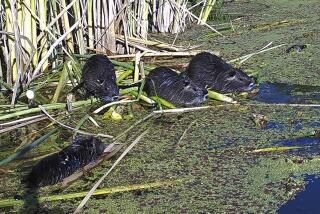Food Destroyed; Sausage Recalled : USDA Action: All food products at the M & M facility were destroyed; Venetian salami, from Canada, was recalled.
- Share via
A Southern California food wholesaler agreed to pay a record fine after health officials discovered widespread rodent infestation in the firm’s cold storage warehouse that held meat and seafood products.
Michael Silver, owner of Lomita-based M&M; Foods, was fined $100,000 because his firm’s downtown Los Angeles warehouse was “adulterated by rodent feces, hair and gnaw marks,” according to the U.S. Department of Agriculture. Silver, who pleaded guilty to two misdemeanor counts, also received three years probation.
The six-figure penalty is the largest ever assessed by USDA for wholesalers who operate cold storage or freezer facilities. There are about 60 such operations in California, according to government estimates.
Upon discovery of the infestation, all food products stored in the M & M facility were destroyed as “unhealthy, unwholesome and unfit for human consumption.” Loss of product was estimated at more than $100,000.
Silver called the fine “outrageous” and said that the USDA was trying to make “an example” of his plight.
The recent infestation problem was the first for the 12-year-old firm, which distributes food to restaurants, hotels and institutional accounts, Silver said. He added that he has been inspected without incident 20 times since USDA last found evidence of rodents in January, 1989.
Silver blamed the rodent infestation on the freezer being in an old building. He also said that regular visits by a pest control firm failed to prevent the problem.
USDA representatives indicate that the incident is not an isolated one: this is the fourth such case in the past year. The other infestations occurred in Oakland and New York City.
“There has been an increase in these problems nationwide but there has also been a corresponding increase in the rodent population,” said Sharin Sachs, chief information officer for the USDA’s Food Safety and Inspection Service, the agency chartered with ensuring the safety and wholesomeness of the meat supply.
Sachs was surprised to hear that Silver felt the fine was outrageous because he “accepted it beforehand, he and his attorneys agreed to this.”
Those familiar with the case speculate that the rodents were able to adapt to the freezer’s cold temperatures by growing a thick coat of fur.
The problems were uncovered during USDA inspections of the company’s facilities in May, 1988, and January, 1989. The fine was levied after the U.S. Attorney’s Office in Encino and Silver entered into a consent agreement late last month. California health officials accompanied USDA personnel during the M & M inspection.
“This is the worst problem I’ve seen in a freezer,” said Dorothy Matthews, supervising investigator for the state’s Food and Drug branch.
M & M Foods’ problems are indicative of how competitors in the food industry can use food safety questions as sales weapons.
After a one-paragraph notice of the recent fine was detailed in a meat industry newsletter, competing firms tried--sometimes successfully--to lure away M & M clients, according to Silver.
He called distribution of the newsletter item “malicious,” and singled out two competitors as being responsible. He named Goldberg & Solovy Foods, Inc., in Vernon and Newport Meat Co. Inc., in Irvine as the companies that have contacted all his clients.
Both firms strongly denied the allegation.
Joe Azzaro, Goldberg & Solovy’s vice president and general manager, said his firm “would never dream of doing (such a thing).”
“We were the victims of a similar (campaign) in the past and we went to court to stop it,” Azzaro said. “If you get involved in muckraking then it eventually spills back on you.”
Ray Nicholas, Newport Meat’s vice president, said “it is not something I would do. We are the finest meat company in Southern California and we don’t need to stoop to anything that low.”
In an unrelated action, the USDA announced last week a recall of two brands of Canadian-made Cacciatora sausage because of “high levels of staphlococcus bacteria.”
The meat is manufactured by Venetian Salami Co. in Montreal and is sold under Venetian Nostrano and Primo labels. The product implicated in the recall is sold in seven-ounce vacuum-packed containers with two sausages per pack.
The items are distributed to the public through grocery stores and delicatessens in 12 states, including California. Canadian health officials have linked 25 illnesses to the product, none of which occurred in the United States.
Consumers who have either brand of sausage should return the product immediately to the place of purchase.
Staphylococcus, is considered particularly troublesome, because it forms a toxin that is not destroyed at normal cooking temperatures. The pathogen, if ingested, can cause sudden onset of illness including nausea, vomiting and diarrhea.
The recall of Venetian Salami products comes at an inopportune time for the Canadian meat industry.
As part of the United States-Canada Free Trade Agreement, there is a proposal being considered that would allow meat and poultry products from the two countries to flow uninterrupted over the international border. Normally, Canadian meat entering this country must conform to U.S. standards and is subject to a separate USDA inspection at the border.
The proposal calls for a one-year experiment during which Canadian meat would be exempt from reinspection.
The public comment period on the plan ended July 30.
Critics of the program have charged that Canadian meat products are not as thoroughly inspected as their U.S. counterparts. USDA officials deny there is any significant disparity.
More to Read
Eat your way across L.A.
Get our weekly Tasting Notes newsletter for reviews, news and more.
You may occasionally receive promotional content from the Los Angeles Times.










